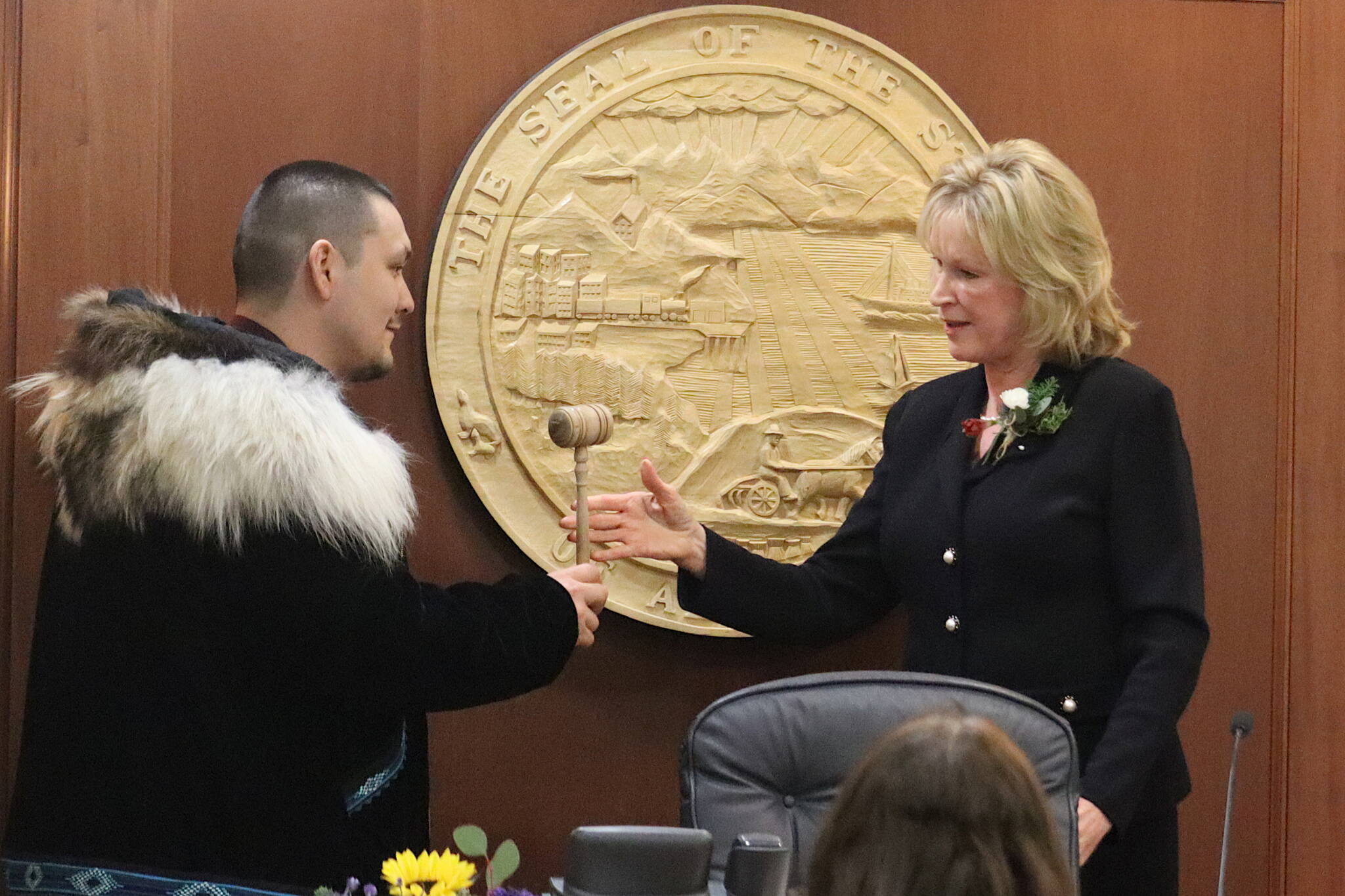The House is still without a majority, but members were at least able to agree on a temporary leader to preside over matters as the 33rd Alaska State Legislature convened Tuesday with lots of ceremonial speeches about cooperating for united purposes, despite a strong undercurrent of divisions in actual business happening at the Capitol during the day.
The session officially began at 1:03 p.m. when the state Senate was gaveled in by Lt. Gov. Nancy Dahlstrom for what turned out to be a congenial and routine 45-minute floor session. She then crossed to the other end of the second floor to gavel in the House at 2:05 p.m. for a largely similar ceremonial start, but 45 minutes into that session the first indicators of the uncertainties in the days and possibly weeks ahead emerged over attempts to nominate a speaker pro tem.
A nomination for Rep. Justin Ruffridge, a Soldotna Republican who Democratic leaders said they supported, resulted in an objection and 10-minute at ease, disrupting what some lawmakers said was an apparent bipartisan agreement. Another nomination was then made by Rep. Laddie Shaw, an Anchorage Republican on behalf of Josiah Patkotak, an independent from Utqiagvik who Republicans are hoping will join a majority coalition.
A vote on Patkotak took place first, which Democrats joined in passing unanimously once he had 21 votes to ensure his nomination.
Patkotak, who was also elected speaker pro tem during the stalemate when the 2020 session opened, said in an interview after Tuesday’s vote “I don’t think there was much orchestrated or anything” after he told acting House leaders he’d be willing to serve in the temporary role again.
“What I’m pursuing is if we can relieve the lieutenant governor of presiding over the House,” he said.
Patkotak presided over one more bit of contentious business during the floor session, as a motion to adjourn immediately followed his nomination. Members were divided about meeting again Wednesday or Thursday, with the former ultimately prevailing despite some lawmakers later stating there’s little chance the majority standoff will be resolved by then
“I think what it does is make us accountable to the House,” Patkotak said, explaining why he favored the earlier meeting date.
As for how long the current stalemate in forming a majority might last, “if I had a crystal ball I’d tell you,” he said.
Both of Juneau’s Democratic representatives — Sara Hannan and Andi Story — opposed the earlier date, which Story said for her part was out of consideration lawmakers who had plans for tomorrow with families and other out.of-town visitors.
The selection of a speaker pro tem made the coming days easier for Dahlstrom, who would have presided over the chamber until one was elected. She said during a news conference before the session started her staff prepared a script and she staged a few practice sessions with them involving different scenarios.
“I don’t know what’s going to happen when we get down the hall there,” she said. “I’m just going to roll with the punches.”
Dahlstrom said she altered her calendar to factor in time for a long standoff including, regrettably, skipping Arctic Winter Games in the Canadian town of Wood Buffalo, Alberta.
“If it takes 20 days or it takes 40 days that’s going to be the priority,” she said.
Smooth sailing in Senate
The opening day of the Senate went far smoother with Sen. Gary Stevens, a Kodiak Republican, quickly elected to preside over a bipartisan majority of nine Democrats and eight Republicans after many years of Republican majorities.
While there have been contentious disputes among current senate members, especially from the three Republicans left out of the majority, the speeches Tuesday all emphasized cooperation and shared goals.
“I can’t think of any of you that hasn’t made great sacrifices to be here,” Stevens said. “We can agree and we can disagree and we can solve problems together without personal attacks.”
In a perhaps coincidental reference, he also talked about how Alaska’s lawmakers aren’t physically divided into separate sections, which also ended up being a relevant reference to the absence of physical barriers that were present during the beginning of last session due to the COVID-19 pandemic.
“We sit together with no barriers,” he said. “No barriers to discussion, to debate (and) to friendship.”
But political realities of the divisions in the upper chamber were clear at a subsequent news conference hosted by senate leadership, where Stevens was asked about the scant committee assignments so far for the three minority members.
“We wanted to get them involved, but there were some concerns about what was going on,” he said, adding one has received an appointment of significance to the transporation committee and “if these are senators we feel we can work with, we can appoint them to meaningful committees as time passes.”
• Contact reporter Mark Sabbatini at mark.sabbatini@juneauempire.com

